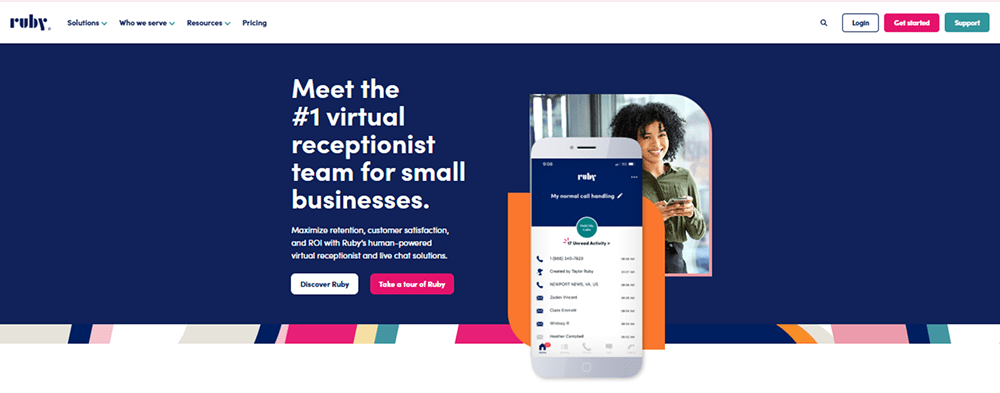Ruby Overview & 2026 Industry Position
Ruby is a leading provider of remote receptionist and live chat services for small to mid-sized businesses. Known for its human-first approach to digital communication, Ruby empowers service professionals, legal firms, startups, and healthcare providers with warm, professional client experiences, even in the absence of in-house staff. In 2026, Ruby continues to thrive amid a saturated customer experience landscape by focusing on trust, responsiveness, and personalization.
With increasing automation in service-related ecosystems, Ruby’s commitment to human interaction positions it as a pivotal player in the growing ‘people-as-a-service’ sector — a market expected to grow by 12.4% globally through 2027. It fills a unique gap between AI chatbots and traditional call centers, delivering on-brand interactions with real humans, 24/7.
From Launch to 2026: Ruby’s Journey
Founded in 2003 in Portland, Oregon, Ruby began as a boutique virtual receptionist firm. By 2010, it had developed its proprietary call-handling platform tailored to small business phone etiquette. In 2015, Ruby introduced mobile accessibility with a business app. 2019 marked the acquisition of ProfessionalChats, expanding Ruby services to live chat. By 2021, Ruby scaled remote operations permanently, solidifying its presence nationwide. In 2023, Ruby launched bilingual services and AI-enhanced call routing. As of 2026, its strategy centers around frictionless, multichannel customer engagement — combining human empathy with intelligent technology.

Ruby Key Features
- 24/7 Virtual Receptionists: Live agents answer calls in your company’s voice, any hour, any day.
- Bilingual Support: English & Spanish available at no extra cost.
- Live Website Chat: Offered via managed prompts and proactive chat popups.
- Mobile App: Users can view call summaries, messages, and set availability in real-time.
- Appointment Scheduling: Seamless integrations with Calendly and Acuity to book on behalf of clients.
- CRM Sync: Automatically updates lead/contact data in HubSpot, Salesforce, and Zoho.
Workflow & UX
Using Ruby is refreshingly intuitive. New users begin by completing a branding questionnaire covering greetings, FAQs, and key team contacts. Receptionists then handle incoming calls using customized scripts, transferring only when criteria are met. The mobile app provides full transparency — from real-time call stats to text transcripts. Ruby also supports dynamic availability settings, ensuring after-hours or holiday adjustments are seamless.
Live chat embeds easily, and Ruby’s agents proactively initiate conversations, helping convert website visitors into qualified leads. In-app notifications paired with CRM syncing mean that communication hand-offs feel natural, with no manual duplication of effort.
Ruby Pricing Analysis & Value Metrics
Ruby offers scalable pricing across its receptionist and live chat services. Below is a breakdown of July 2026 pricing:
| Plan | Included Minutes | Live Chat | Monthly Price |
|---|---|---|---|
| Starter | 100 | Not included | $319 |
| Grow | 200 | Yes (up to 10 chats) | $629 |
| Scale | 500 | Yes (up to 30 chats) | $1,349 |
| Custom | 1,000+ | Yes (unlimited) | Contact Sales |
Value-wise, Ruby delivers a strong ROI for customer-facing businesses. Its hybrid of technology and empathy helps capture leads missed by voicemail or bot-only setups — a key differentiator in 2026’s service-first economy.
Competitive Landscape
In the 24/7 virtual receptionist space, Ruby competes with:
- Smith.ai: Combines AI screening with live receptionists; excels in legal use cases.
- AnswerConnect: Offers similar services at lower cost but lacks Ruby’s personalized onboarding and UX design.
- Davinci: Strong in virtual mailbox and address services; weaker in live engagement.
Use Cases That Shine
Ruby is an ideal fit for industries where timely customer interaction builds trust and converts leads. Common profiles include:
- Law firms that need client intake but not full-time staff
- Medical or dental clinics handling patient inquiries and schedule gaps
- Consultants or real estate pros frequently in meetings or travel
- Marketing agencies that use proactive chat for lead capture
Pros & Cons
- Pros: 24/7 availability; highly personalized call handling; seamless live chat; robust mobile app; bilingual support.
- Cons: Premium pricing may deter low-volume users; not ideal for high-volume call centers; setup process takes time to customize.
Pro Tip: For maximum ROI, use Ruby alongside CRM tools like HubSpot to automate lead follow-up after receptionist interactions.
Ruby FAQ
Ruby is best suited for law firms, healthcare offices, real estate agents, and consultants — essentially any service business requiring consistent client contact.
Yes, Ruby integrates with popular CRMs including Salesforce, HubSpot, and Zoho to sync contacts and call notes automatically.
Not yet. As of 2026, Ruby focuses on phone and web chat communication; SMS support is planned for future updates.
No — it enhances access to call transcripts, message logs, and availability settings but isn’t mandatory for using Ruby services.
Most Ruby customers are fully onboarded within 48–72 hours, depending on the complexity of call scripts and integrations requested.

